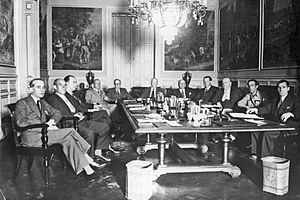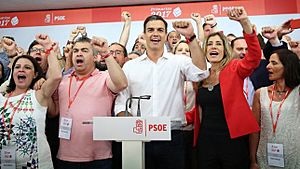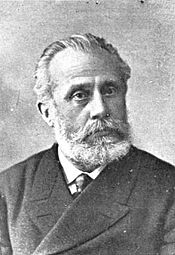Spanish Socialist Workers' Party facts for kids
Quick facts for kids <div style="padding-top:0.3em; padding-bottom:0.3em; border-top:2px solid Lua error in Module:European_and_national_party_data/config at line 227: attempt to index field 'data' (a nil value).; border-bottom:2px solid Lua error in Module:European_and_national_party_data/config at line 227: attempt to index field 'data' (a nil value).; line-height: 1;">
Spanish Socialist Workers' Party
Partido Socialista Obrero Español
|
|
|---|---|
 |
|
| Abbreviation | PSOE |
| Secretary General | Pedro Sánchez |
| Deputy Secretary General | María Jesús Montero |
| President | Cristina Narbona |
| Founder | Pablo Iglesias Posse |
| Founded | 2 May 1879 |
| Headquarters | C/ Ferraz, 70 28008, Madrid |
| Newspaper | El Socialista |
| Student wing | Campus Joven |
| Youth wing | Socialist Youth of Spain |
| Membership (2023) | |
| Ideology | Social democracy |
| Political position | Centre-left |
| National affiliation | Republican–Socialist Conjunction (1909–1919, 1931–1933) Alliance of the Left (1918) Popular Front (1936–1939) |
| European affiliation | Party of European Socialists |
| International affiliation | Progressive Alliance Socialist International |
| European Parliament group | Progressive Alliance of Socialists and Democrats |
| Colours | Red |
| Anthem | "Himno del PSOE" ('Anthem of the PSOE') |
| Congress of Deputies | Lua error in Module:European_and_national_party_data/config at line 227: attempt to index field 'data' (a nil value). |
| Senate | Lua error in Module:European_and_national_party_data/config at line 227: attempt to index field 'data' (a nil value). |
| European Parliament (Spanish seats) | Lua error in Module:European_and_national_party_data/config at line 227: attempt to index field 'data' (a nil value). |
| Regional Parliaments |
324 / 1,261
|
| Regional Governments |
5 / 19
|
| Local government |
20,784 / 60,941
|
| Election symbol | |
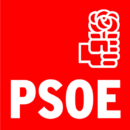 |
|
| Website | |
| Lua error in Module:European_and_national_party_data/config at line 227: attempt to index field 'data' (a nil value). | |
The Spanish Socialist Workers' Party (known as PSOE) is a major political party in Spain. It is a social democratic party, which means it believes in a fair society where everyone has equal chances and the government helps people. The PSOE has been in charge of the Spanish government for a long time in modern democratic Spain. Its leaders who have served as Prime Minister include Felipe González (1982–1996), José Luis Rodríguez Zapatero (2004–2011), and Pedro Sánchez (since 2018).
The PSOE was started in 1879, making it the oldest active political party in Spain. It played a big part during the Second Spanish Republic (1931–1939). After the Spanish Civil War, the party was banned under the Francoist dictatorship. Its members were treated badly or had to leave the country. The ban was lifted in 1977 when Spain became a democracy again. The PSOE used to follow Marxism, but it changed its ideas in 1979. Like many Spanish political groups, the PSOE supports European integration, which means working closely with other European countries.
The PSOE has strong connections with the General Union of Workers (UGT), a large workers' union in Spain. In the past, you had to be a UGT member to join the PSOE. However, since the 1980s, the UGT has sometimes disagreed with the PSOE's economic plans. The PSOE has traditionally attracted more female voters than other parties. Important laws like legalizing same-sex marriage and adoption were passed in 2005 when the PSOE was in government. More recently, a law was passed to give more freedom regarding gender identity.
The PSOE is part of several international groups, including the Party of European Socialists, Progressive Alliance, and the Socialist International. Its members in the European Parliament are part of the Progressive Alliance of Socialists and Democrats group.
History
How the Party Started (1879–1931)
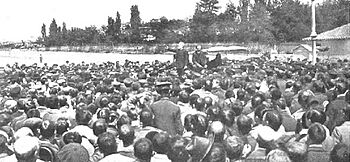
The PSOE was founded by Pablo Iglesias on May 2, 1879. He was a typesetter who had learned about workers' rights. The party's first plan was approved by about 40 people on July 20 of the same year. The PSOE and its union, the Unión General de Trabajadores (UGT), mostly grew in the Madrid, Biscay, and Asturias areas until the 1910s. When Pablo Iglesias won a seat in the Spanish Parliament in 1910, it was a big moment for the party and made it more known across Spain.
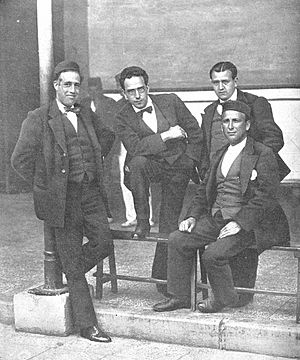
The PSOE and UGT played a big role in a general strike in August 1917. The army stopped the strike, and the leaders who organized it were sent to prison. They were released a year later after being elected to Parliament. Between 1919 and 1921, some members left the PSOE to form communist parties. The PSOE was a member of the Labour and Socialist International from 1923 to 1940.
After Pablo Iglesias passed away in 1925, Julián Besteiro became the new president of both the PSOE and UGT. During the dictatorship of Miguel Primo de Rivera (1923–1930), some PSOE members worked with the government, while others wanted to work with republican groups.
During the Second Republic and Civil War (1931–1939)
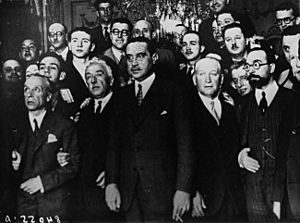
When the Second Spanish Republic was declared on April 14, 1931, three PSOE members became ministers in the new government. They were Indalecio Prieto (Finance), Fernando de los Ríos (Education), and Francisco Largo Caballero (Labour). Socialists continued to be part of the government until 1933.
After the 1933 election, which was won by center-right parties, Largo Caballero started using strong language, calling for a revolution. The Socialist Youth of Spain also used revolutionary words.
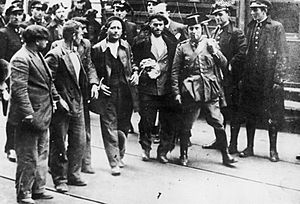
In October 1934, when new ministers from a right-wing party joined the government, many on the left saw it as a step backward. The UGT called for a nationwide strike, which turned into a big uprising in Asturias. After the revolt was stopped, most PSOE and UGT leaders were put in jail.
A disagreement grew between Prieto and Largo Caballero in 1935. The PSOE then joined a group of left-wing parties called the Popular Front for the 1936 election, which they won.
In September 1936, during the Spanish Civil War, Largo Caballero became the head of the government. Later, in 1937, another socialist, Juan Negrín, took over as prime minister.
Hidden and in Exile (1939–1974)
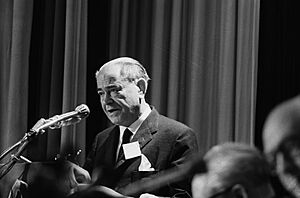
During the Francoist dictatorship (1939–1975), the PSOE was banned. Its members were arrested, forced to leave the country, or even executed. Many leaders, like Prime Minister Negrín, fled to France. The party was only allowed to be active again in 1977.
The party was reorganized in 1944 in France, where Rodolfo Llopis became the new secretary-general. During the Cold War, the PSOE in exile was strongly against communism. However, the leaders in exile became less connected to the party members still secretly in Spain.
Return to Democracy
Felipe González's Time (1974–1996)

In 1974, Felipe González was chosen as the new Secretary-General. He wanted to change the PSOE from a Marxist party to a social democratic one, like other parties in Western Europe. In 1977, the PSOE became the main opposition party in Spain. Their position grew stronger in 1978 when another socialist party joined them.
In 1979, González resigned because the party didn't want to give up its Marxist ideas. But later that year, he was re-elected when the party agreed to move away from Marxism. Other European social democratic parties supported González. The PSOE's symbol changed to the fist and rose. In 1978, the PSOE supported the Spanish constitution, which was approved. In the 1982 election, the PSOE won by a lot, and González became Prime Minister of Spain. He stayed in this job until 1996.
Even though the party had been against NATO, most leaders supported Spain staying in the organization once they were in government. The González government held a vote on it in 1986, asking people to vote yes, and they won. The PSOE also supported the United States in the Gulf War (1991). The PSOE won elections in 1986, 1989, and 1993. Under González, government spending on education, health, and pensions increased a lot.
Economic problems and a scandal involving a state-sponsored group against the ETA terrorist group made González less popular. In the 1996 election, the PSOE lost to the conservative People's Party (PP). Between 1996 and 2001, the PSOE went through a difficult time. They lost heavily in the 2000 election but remained in power in some regions like Andalusia and Asturias.
Zapatero and Rubalcaba's Time (2000–2014)
In 2000, José Luis Rodríguez Zapatero became the new Secretary-General. The PSOE strongly opposed the Iraq War, which the previous government had supported.
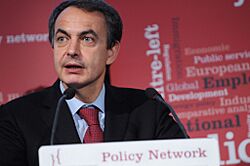
In the 2003 Catalan regional election, the PSOE's Catalan branch gained more votes. They formed a government with other parties in Catalonia and governed until 2010.
In the 2004 Spanish general election, the PSOE won after the terrorist attacks in Madrid on March 11. The PSOE also won the 2004 European Parliament election.
In 2005, the PSOE supported a "yes" vote on the European Constitution. The PSOE also supported talks between the government and ETA during a ceasefire in 2006. In the 2008 Spanish general election, the PSOE won again, and Zapatero remained prime minister.
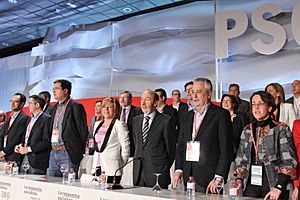
After losing popularity due to the economic crisis, the PSOE lost the 2011 Spanish general election to the People's Party. Afterward, Alfredo Pérez Rubalcaba was elected Secretary-General. This caused some disagreements within the party.
In 2013, the PSOE introduced new ideas, moving more to the left to try and win back voters. However, in the 2014 European Parliament election, the PSOE lost again, partly because new parties like Podemos gained support. Rubalcaba then resigned.
Pedro Sánchez's Time (2014–Present)
In 2014, Pedro Sánchez was elected Secretary-General in a new type of election where party members voted directly.
In the 2015 local elections, the PSOE had one of its worst results since democracy returned. This showed that the two-party system in Spain was changing, with new parties gaining power. The 2015 Spanish general election resulted in no clear winner, and a new election was held six months later. In the 2016 Spanish general election, the PSOE lost even more seats, reaching its lowest number since democracy was restored.
Elections during Sánchez's early leadership were mostly losses for the PSOE. His refusal to let the People's Party form a government led to a crisis within the party in 2016. Many leaders resigned, and Sánchez stepped down as Secretary-General. However, he ran again in 2017 and won, returning as Secretary-General.
In mid-2018, a court found that the People's Party had benefited from illegal money schemes. The PSOE then proposed a vote to remove the prime minister, Mariano Rajoy. This vote passed with support from several other parties, and Sánchez became prime minister on June 2, 2018, leading a minority government. In December 2018, the PSOE's branch in Andalusia lost power for the first time since democracy returned.
For most of his first term, Sánchez relied on support from other parties to pass his plans. In February 2019, some parties stopped supporting his government, and Sánchez called an early election. In the April 2019 Spanish general election, the PSOE won, gaining many seats in both the Congress and the Senate. The PSOE also became the largest party in the European Parliament after the 2019 European Parliament election. They gained seats and votes in most regions of Spain.
After months of political disagreements, Sánchez called another general election in November 2019. The PSOE lost a few seats but remained the largest party. On January 7, 2020, a government was formed with the PSOE and Unidas Podemos.
In 2021, the PSOE started a podcast called Donde hay partido.
What the Party Believes In
From Marxism to Social Democracy
When the PSOE was founded in 1879, its main goal was to protect the rights of workers and achieve the ideas of socialism. This meant giving political power to the working class and creating a society where the government controlled how things were made. Over time, the PSOE's ideas changed as Spain and the world changed.
In 1979, the party officially stopped following Marxism. This was a big change led by its Secretary-General, Felipe González. Some members who still believed in Marxism formed a group called "Left Socialists." After this, the PSOE became more like other European social democratic parties, accepting a market economy but still wanting to help people. Some members have criticized the party for becoming too economically liberal, meaning they felt it supported too much deregulation and cuts to social benefits.
The PSOE now describes itself as social democratic, left-wing, and progressive. It works with other similar parties in Europe and supports working together within Europe. In 2017, party leader Pedro Sánchez spoke about renewing social democracy to move towards a society that goes beyond traditional capitalism.
Federalism
During the Second Spanish Republic, there were different ideas within the party about how Spain should be organized. Some wanted a centralized government, while others preferred a federal system, where regions have more power. After the Francoist dictatorship, the PSOE supported the idea that different parts of Spain should have the right to decide their own future. However, they later focused more on a federal system without mentioning "self-determination" as much. Some members support the independence of regions like Catalonia or the Basque Country, while others strongly disagree, believing it would harm equality between regions.
Electoral Performance
Restoration Cortes
| Restoration Cortes | |||||
| Election | Leading candidate | Candidature | Congress | Senate | Gov. |
|---|---|---|---|---|---|
| 1907 | Pablo Iglesias Posse |
0 / 404
|
0 / 180
|
— | |
| 1910 | Within CRS |
1 / 404
|
0 / 180
|
||
| 1914 | Within CRS |
1 / 408
|
0 / 180
|
||
| 1916 | Within CRS |
1 / 409
|
0 / 180
|
||
| 1918 | Within AI |
6 / 409
|
0 / 180
|
||
| 1919 | Within CRS |
6 / 409
|
0 / 180
|
||
| 1920 |
4 / 409
|
0 / 180
|
|||
| 1923 |
7 / 409
|
0 / 180
|
|||
Republican Cortes
| Republican Cortes | ||||
| Election | Leading candidate | Candidature | Seats | Gov. |
|---|---|---|---|---|
| 1931 | Francisco Largo Caballero | Within CRS |
116 / 470
|
|
| 1933 |
59 / 473
|
|||
| 1936 | Indalecio Prieto | Within FP |
99 / 473
|
|
Cortes Generales
| Cortes Generales | ||||||||
| Election | Leading candidate | Congress | Senate | Gov. | ||||
|---|---|---|---|---|---|---|---|---|
| Votes | % | Seats | Votes | % | Seats | |||
| 1977 | Felipe González | 5,371,866 | 29.3 (#2) |
118 / 350
|
5,714,036 | 11.0 (#2) |
35 / 207
|
|
| 1979 | 5,469,813 | 30.4 (#2) |
121 / 350
|
12,762,128 | 25.4 (#2) |
60 / 208
|
||
| 1982 | 10,127,392 | 48.1 (#1) |
202 / 350
|
27,954,856 | 47.6 (#1) |
134 / 208
|
||
| 1986 | 8,901,718 | 44.1 (#1) |
184 / 350
|
24,719,863 | 44.5 (#1) |
124 / 208
|
||
| 1989 | 8,115,568 | 39.6 (#1) |
175 / 350
|
22,272,484 | 40.1 (#1) |
107 / 208
|
||
| 1993 | 9,150,083 | 38.8 (#1) |
159 / 350
|
25,441,605 | 39.0 (#1) |
96 / 208
|
||
| 1996 | 9,425,678 | 37.6 (#2) |
141 / 350
|
25,865,206 | 37.7 (#2) |
81 / 208
|
||
| 2000 | Joaquín Almunia | 7,918,752 | 34.2 (#2) |
125 / 350
|
16,323,744 | 26.3 (#2) |
53 / 208
|
|
| 2004 | José Luis Rodríguez Zapatero | 11,026,163 | 42.6 (#1) |
164 / 350
|
25,666,070 | 36.5 (#2) |
81 / 208
|
|
| 2008 | 11,289,335 | 43.9 (#1) |
169 / 350
|
25,965,221 | 37.2 (#2) |
86 / 208
|
||
| 2011 | Alfredo Pérez Rubalcaba | 7,003,511 | 28.8 (#2) |
110 / 350
|
16,469,470 | 26.0 (#2) |
48 / 208
|
|
| 2015 | Pedro Sánchez | 5,545,315 | 22.0 (#2) |
90 / 350
|
14,887,751 | 22.4 (#2) |
47 / 208
|
— |
| 2016 | 5,443,846 | 22.6 (#2) |
85 / 350
|
15,354,929 | 23.6 (#2) |
43 / 208
|
||
| Apr. 2019 | 7,513,142 | 28.7 (#1) |
123 / 350
|
21,058,377 | 29.3 (#1) |
123 / 208
|
— | |
| Nov. 2019 | 6,792,199 | 28.0 (#1) |
120 / 350
|
19,481,846 | 30.6 (#1) |
93 / 208
|
||
| 2023 | 7,821,718 | 31.7 (#2) |
121 / 350
|
21,970,469 | 32.2 (#2) |
72 / 208
|
||
European Parliament
| European Parliament | |||||
| Election | Leading candidate | Votes | % | Seats | EP Group |
|---|---|---|---|---|---|
| 1987 | Fernando Morán | 7,522,706 | 39.1 (#1) |
28 / 60
|
SOC |
| 1989 | 6,275,552 | 39.6 (#1) |
27 / 60
|
||
| 1994 | 5,719,707 | 30.8 (#2) |
22 / 64
|
PES | |
| 1999 | Rosa Díez | 7,477,823 | 35.3 (#2) |
24 / 64
|
|
| 2004 | Josep Borrell | 6,741,112 | 43.5 (#1) |
25 / 54
|
|
| 2009 | Juan Fernando López Aguilar | 6,141,784 | 38.8 (#2) |
23 / 54
|
S&D |
| 2014 | Elena Valenciano | 3,614,232 | 23.0 (#2) |
14 / 54
|
|
| 2019 | Josep Borrell | 7,369,789 | 32.9 (#1) |
21 / 59
|
|
| 2024 | Teresa Ribera | 5,290,945 | 30.2 (#2) |
20 / 61
|
|
Organization
Party Logos Over Time
Party Leaders
The Secretary General has been the main leader of the party since 1974. Before that, the party was led by its President.
|
|
|
|
Regional Leaders
- Andalusia: Juan Espadas (since 2021)
- Aragon: Javier Lambán (since 2012)
- Asturias: Adrián Barbón (since 2017)
- Balearic Islands: Francina Armengol (since 2012)
- Basque Country: Eneko Andueza (since 2021)
- Canary Islands: Ángel Víctor Torres (since 2017)
- Cantabria: Pablo Zuloaga (since 2017)
- Castile and León: Carlos Martínez Mínguez (since 2025)
- Castilla-La Mancha: Emiliano García-Page (since 2012)
- Catalonia: Salvador Illa (since 2021)
- Ceuta: Vacant (since 2024)
- Community of Madrid: Juan Lobato (since 2021)
- Extremadura: Miguel Ángel Gallardo (since 2024)
- Galicia: José Ramón Gómez Besteiro (since 2024)
- La Rioja: Concha Andreu (since 2021)
- Melilla: Sabrina Moh Abdelkader (since 2024)
- Murcia: José Vélez (since 2021)
- Navarre: María Chivite (since 2014)
- Valencian Community: Diana Morant (since 2024)
Party Terms
- Baron: This is an informal name for the party's regional leaders. They can be very powerful, especially if they lead a region. This term is not used as much now.
- Compañero: This means "companion" or "comrade" and is a way Socialists address each other.
Groups Within the Party
The PSOE has had different groups or "factions" based on people's ideas or who they supported. Sometimes these groups caused disagreements. For example, there were the Guerristas (supporters of Alfonso Guerra) and the Renovadores (who wanted to renew the party). More recently, there were the Sanchistas (supporters of Pedro Sánchez) and Susanistas (supporters of Susana Díaz). The Sanchistas won in the 2017 leadership election.
See also
 In Spanish: Partido Socialista Obrero Español para niños
In Spanish: Partido Socialista Obrero Español para niños
- List of political parties in Spain
- Politics of Spain
- First Congress of the PSOE


